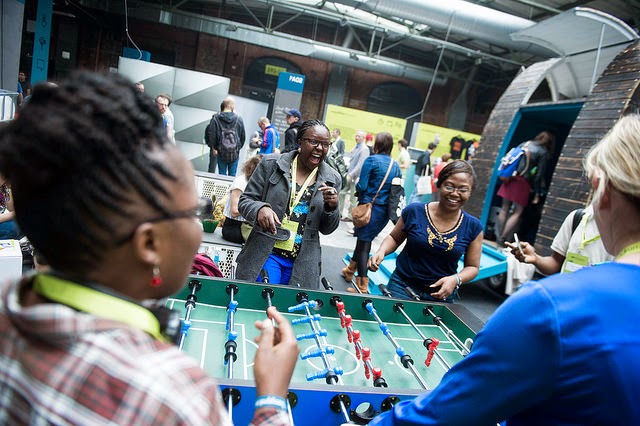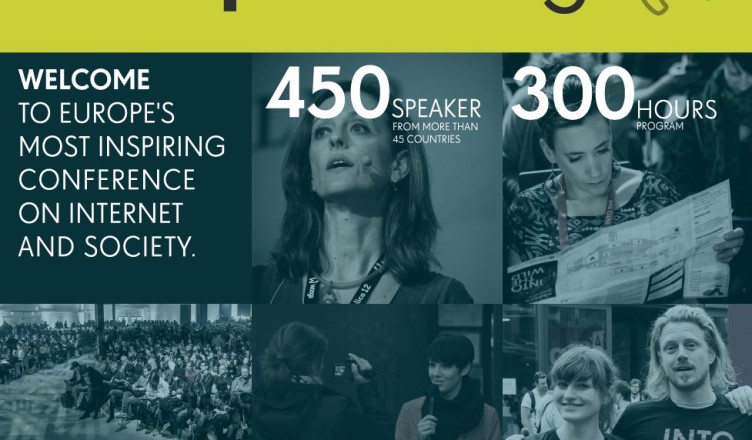 |
| Some of the GIG-ers [Global Innovation Gathering participants] playing fussball at the GIG booth. Techies know how to have fun. Work hard, Play hard Photo Credit: re:publica |
13 stages, 3 days, 7000 people, 300 hours of sessions and lots of coffee are what people call familiar at what is one of the biggest tech related conferences ever – Re:publica. I would say the same – but mostly because I have not seen that many people at an event before having so much fun and serious conversations at the same time.
I was speaking at that event about Political Blogging in Sub Saharan Africa. Here is the video.
In attendance were people like Tim Hastings, CEO of Netflix and people from Wikileaks, Global Voices and off-course Google as everyone toiled to get their message across. It was actually a little bit funny – there was lots of advocates for cyber security and privacy as much as there were people advocating for openness and neutrality of the internet. It was overwhelming – I remember sitting through Big Data with Tricia Wang and thinking: so Big Data is actually a thing and what is small data then? Then I headed over to @Schwarzblond who basically was affirming my fears and hopes about these viral social media viral campaigns and customer care and how far social media campaigns run by corporate campaigns can go.
And that is not even the tip of the iceberg in regards to the content there was to learn, listen to, take in or just take note of. Then there was the crazy ‘GIGers’ – as they are now known to me – the participants of the Global Innovation Gathering. This took place right before Republica: they are crazy techie people from all over the world, so crazy that they talk, walk code. They had people as young as Njeri Chelimo who is 21 years old and can easily be mistaken for a 30 year old because she owns a coding school for young people in Nairobi Kenya.
It was overwhelming;
But what stood out for me? Quite a few things that I hope to cover in a series of blogs. The first was a session titled : The system is broken and that is a good thing which was the keynote address as delivered by Ethan Zuckerman – also founder of Global Voices and Tripod. He talked about current growing trends in politics and governance which make a lot of sense in the African context.
Low voter turnout:
The current growing trends as seen in Europe and America in regard to elections are declining voter turn up rates. The last election in America had the worst ever voter turnout in over 72 years. In 2014, European Parliament election turnout was the lowest ever – and the stats show that it has been dropping since 1979 to the present. This is a trend that we are also continuing
to see in developing countries –It is usually a good turnout when it is presidential elections but with the other elections not so much. [1]In 1996 voter turnout in Uganda was 70.60% – this has steadily decreased up to 59.25% in 2011. I am keen to find out what it will be in 2011.
to see in developing countries –It is usually a good turnout when it is presidential elections but with the other elections not so much. [1]In 1996 voter turnout in Uganda was 70.60% – this has steadily decreased up to 59.25% in 2011. I am keen to find out what it will be in 2011.
Protests:
We also see a growing trend of people going out to the streets to create a different atmosphere for change. We have seen so many protests in the last decade that this seems to be ‘the
golden age of protests’ as Zuckerman referred to it. These protests are not run by unemployed, uneducated people – they are run by educated, employed because that is who are looking for something new for their societies. The Occupy movement, the Arab Spring, The Spain Indignants & 15-M Movement, – for some of these protests it was we may live in a democracy but the system is so broken that we have to fix it. But we also know that for most these movements bring the change that they were created to do. The Arab Spring is a perfect example and we wait to see what happens in Burundi as well.
golden age of protests’ as Zuckerman referred to it. These protests are not run by unemployed, uneducated people – they are run by educated, employed because that is who are looking for something new for their societies. The Occupy movement, the Arab Spring, The Spain Indignants & 15-M Movement, – for some of these protests it was we may live in a democracy but the system is so broken that we have to fix it. But we also know that for most these movements bring the change that they were created to do. The Arab Spring is a perfect example and we wait to see what happens in Burundi as well.
The internet
We had no idea that we would be able to see companies like Microsoft and Google taking over the world. We had no idea that we would see Facebook and other social networking sites begin to unite people from all kind of races and places [apart from China]. But we do now. There was a time we thought that governments especially in Africa did not care about the internet and what transpired there – but after Burundi riots begin – the first thing that is shut down is the
internet. Our governments continue to cower at the thought of the internet and its possibilities instead of embracing it and using it for change in what the public perceive as the right way. What we instead we see is governments using Twitter and Facebook for campaigns, elections and Public Relations. Kenya and South Africa are great examples. The Ugandan president got onto twitter recently, probably because elections are coming next year.
internet. Our governments continue to cower at the thought of the internet and its possibilities instead of embracing it and using it for change in what the public perceive as the right way. What we instead we see is governments using Twitter and Facebook for campaigns, elections and Public Relations. Kenya and South Africa are great examples. The Ugandan president got onto twitter recently, probably because elections are coming next year.
So now that the internet is not delivering democracies as we had hoped, protest and movements not creating change and now that people do not trust governments anymore that they are not lining up to vote – what do we do? Create other systems and things to do that will not just foster transparency but allow people to monitor daily what their governments
are doing.
are doing.
Examples of such include the Promise Trackers that are being used in Brazil and the Monithon, a monitoring marathon which is monitoring and auditing EU funded projects among other things in Europe. What the latter does is have people go door to door asking – what do you think of a certain project and it is so far working. Transparency is no longer the way to go but rather inclusive monitoring governments and the promises that say they will deliver, daily.
It is no longer about just voting or joining in a protest – we have to do more, we can do more. Remind the people we voted into power of what it is that we voted them to do. We need to actively take on open-source governance and actively participate all the way.

It would be helpful if you could prvdoie an email address so that candidates declaring can be notified to you. Parties and candidates could then contact you directly and give you the details.